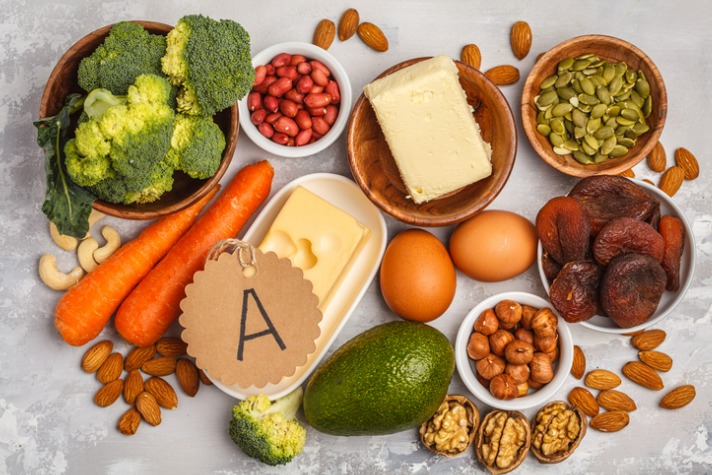Vitamin A
Published by MAXSolutions on May 08, 2023

Its antioxidant and anti-inflammatory effects help to protect cells from damage.[2]
Getting your essential vitamin A every day won’t enable you to see in the dark, but your eyes do need vitamin A to stay healthy.
Which foods have Vitamin A?
Meat, full-fat dairy and egg yolks are all good sources of vitamin A.
Fruits, including the orange pigment, and vegetables are also a good source.
The way you prepare your food affects how well vitamins are absorbed.
For example, cutting up or cooking vitamin A-rich food will help you get the most out of it.[1]
The best way to get enough vitamin A is to eat a varied diet that includes healthy proteins and plenty of fresh fruits and vegetables.
Taking a vitamin supplement may mean you get enough vitamin A into your body, but there may not be enough of other nutrients that your body needs to absorb the amount you need.[1]
However, some people need to take supplements when their diet is restricted. Talk to your doctor if you are worried.
How much Vitamin A do I need?
The Recommended Daily Intake in Australia for vitamin A ranges from 250μg (micrograms) daily for infants 0 to 6 months of age, to 900μg daily for men and 700μg daily for women.
Pregnant women and breastfeeding mothers should consult a dietitian for specific nutrition advice.[2]
Vitamin A is a fat-soluble vitamin, which means it gets stored in your body’s own cells. This means that if you have more supplements than you need, vitamin A will build up in your body.
It is unlikely that you will experience health problems from eating lots of vitamin-rich food.
But in some rare cases, if you have lots of a particular food (such as very large quantities of carrot juice or liver), vitamin A might build up over time.
Can I have too much Vitamin A?
Your body converts beta-carotene into vitamin A. Beta-carotene is an antioxidant that makes carrots orange and mangoes yellow.
If you have too much beta-carotene, your skin can turn a little yellow.
It is possible to take too much vitamin A so be careful. Taking high doses over a long period of time can result in harmful levels in the body.
There are some studies that show a link between beta-carotene supplements and an elevated risk of lung cancer in people who smoke cigarettes.[3]
The Cancer Council recommends that you avoid taking more than 19mg of beta-carotene supplements, especially if you smoke.
The best way for most people to get the right amount of vitamin A is to have a varied diet that includes a lot of fresh fruit and vegetables.
If you are concerned about your diet, please consult with your doctor.
References
1. Vitamin A and your health | healthdirect
2. BETA-CAROTENE: Overview, Uses, Side Effects, Precautions, Interactions, Dosing and Reviews (webmd.com)
3. Vitamin pills' role in recovering from cancer | Cancer Council
Share
Tags
Found this useful?
Help and advice
Our blogs are about helping people seek the information that they need for their steps in the workforce.














_1.jpg)





























.jpeg)

















